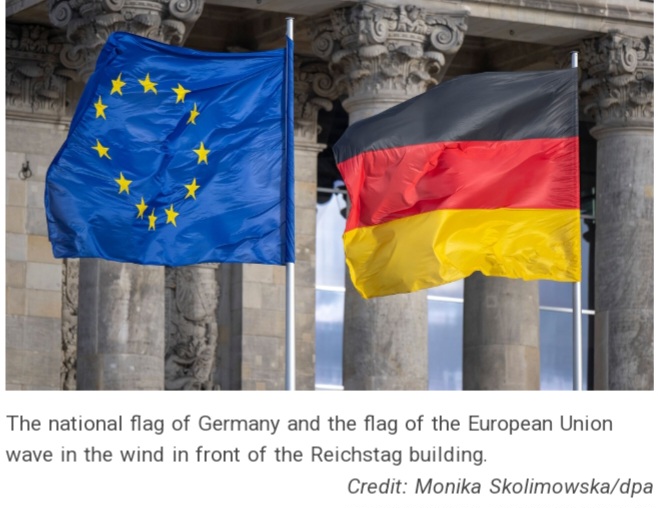Germany would suffer severe economic damage if if left the European Union, researchers from the German Economic Institute (IW) wrote in a report made available to dpa.
An exit from the EU, the economists wrote in their analysis, “would deliberately trigger a severe economic crisis and a lasting loss of prosperity for the population in Germany.”
The far-right Alternative for Germany (AfD) party wants to partially reverse European integration. In their view, the EU should only be an economic and interest group of loosely connected individual states.
The researchers from the Cologne-based institute estimated a 5.6% decline in real gross domestic product (GDP), or around €690 billion ($751 billion), could be expected five years after a German exit.
Around 2.5 million jobs could be lost in the fifth year. This is roughly equivalent to the economic value-added losses of the coronavirus pandemic and the energy cost crisis following the Russian invasion of Ukraine.
The figures are based on a scenario in the past, but costs for the future would be similarly high. The researchers calculated what would have happened to Germany if it had left the EU at the same time as the United Kingdom. UK voters approved the exit, commonly known as Brexit, in 2016 and it took effect in 2020.
To determine this, they first analysed the economic impact of Brexit on the UK from the referendum in summer 2016 to 2021 and then transferred these effects to Germany – taking into account the differences between the two countries.
The impact of an actual German exit from the EU would probably be higher, according to the authors, who point to Germany’s closer ties with other EU states and its use of the common euro currency.
The decision to leave the EU had already led to a loss of growth in the UK before its implementation on January 31, 2020, the researchers wrote.
The pound had lost value against the euro, making imports more expensive. Uncertainty about future relations with the EU had a negative impact on investments. In addition, the UK missed out on the boom in trade within the EU as a result of Brexit.
Although the government in London was able to conclude new free trade agreements with other countries, these essentially reproduced the EU’s agreements with these states. New market access opportunities have therefore not opened up.
The UK concluded two new agreements with Australia and New Zealand. However, the British government expects only a very small long-term boost to economic output: 0.08% GDP growth from the agreement with Australia and 0.03% from the agreement with New Zealand – and both by 2035.
“Compared to the estimated losses of 5% to 10% of economic output as a result of Brexit, these benefits are negligible,” wrote the authors of the study.












































